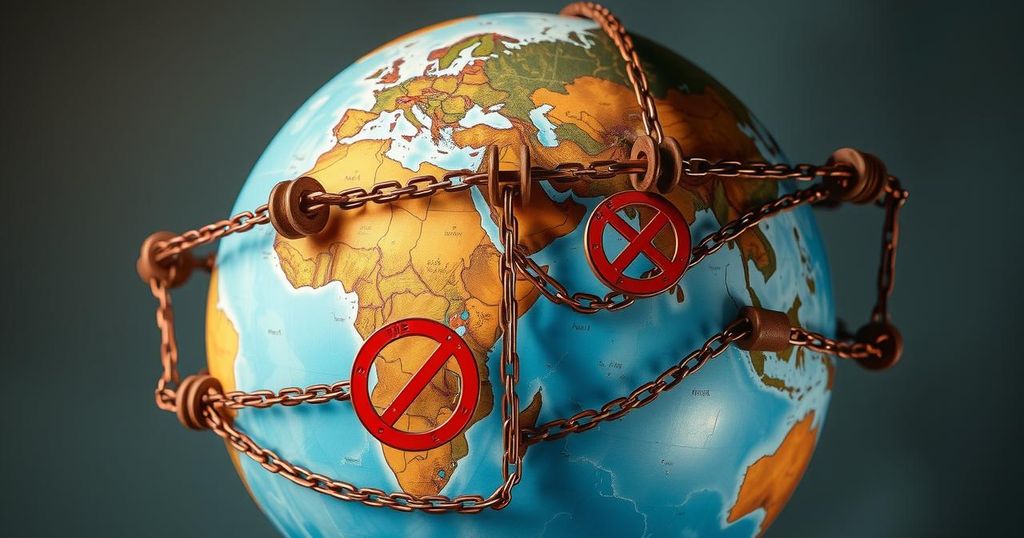President Trump Revives Travel Ban, Transforming America into a Travel Minefield
President Trump has reinstated a sweeping travel ban affecting over a dozen countries, sparking significant turmoil in the travel industry. The policy, effective Monday, imposes strict restrictions on multiple nations while raising concerns over international relations and personal implications. Legal challenges are anticipated, adding to a climate of uncertainty for travelers and businesses alike.
In a striking development, President Donald Trump has revived the controversial travel ban, marking the third iteration of such restrictions. This new proclamation takes effect Monday at 12:01 a.m. and targets citizens from 13 countries, along with heightened restrictions on eight others. The latest travel ban aims to tighten security measures, yet it has sparked renewed concerns over international relations and disrupted travel plans for countless individuals and families alike.
Countries facing a complete entry ban include Afghanistan, Burma, Chad, and Syria, among others. Additional restrictions have been imposed on citizens from Cuba, Laos, and Venezuela. These measures come amid claims of national security, but critics argue that the geopolitical ramifications are enormous, potentially straining ties with nations that have long-standing connections to the U.S. international community.
The implications for the travel industry are immediate and severe. Airlines are bracing for a surge in cancellations and rebooking requests as customers scramble to adjust their travel plans. Airport staff are reviewing updated protocols while immigration officials prepare for likely confusion at checkpoints. Many international students and professionals may be left in limbo, their travel disrupted without warning.
Hoteliers and travel agents are also feeling the heat—especially in areas with high numbers of tourists from the banned countries. Operators in cities such as New York and Miami may see significant declines in bookings. The ripple effects could even lead to job losses in the hospitality sector. Notably, business travelers from these regions now find themselves unable to attend crucial meetings and seminars, creating additional economic woes.
International reactions to this renewed ban are building. Countries affected might retaliate by imposing their restrictions on American travelers, which could lead to escalating tensions. Lawmakers and global leaders are expressing their concerns over the risk of isolating the U.S. politically and economically, especially given the interconnectedness of today’s world.
As legal battles loom, civil rights groups are already poised to challenge the travel restriction in court. Past iterations of Trump’s travel ban faced significant judicial scrutiny, a dynamic that may unfold again. The complex political landscape could shape how effectively these new measures hold against opposition.
Travel technology platforms are juggling the complexities of rapidly changing policies and the heightened need for communication with clients. Booking systems may need adjustments, forcing travel advisors into roles that combine itinerary planning with crisis management. A ground-shifting landscape now looks more like a minefield for the global traveler.
Ultimately, this directive symbolizes not just a policy shift, but a deepening fracture in personal connections. Students, families, and business partnerships stand to suffer, their plans thwarted by decisions made far removed from their lives. As travel becomes increasingly restricted, there is a call for a reevaluation of the principles of global mobility and reconciliation.
The reinstated travel ban beckons a crucial conversation within the travel community about fostering inclusivity and cooperation. It is more than just a jab at national security; it is an obstacle to understanding and progress in a time when connection is vital. With the summer travel season fast approaching, the travel industry might not only remember the journeys taken, but also those unjustly cut short.
The reimplementation of the travel ban by President Trump is proving to be a significant shock to the travel and tourism sectors. With restrictions targeting a broader range of countries than before, confusion at airports, substantial impacts on hotels and airlines, and potential backlash from affected nations are all expected. Legal challenges are likely to arise in response to this proclamation, further complicating matters. Finally, the emotional ramifications for individuals cut off from family and opportunities cannot be overstated. The essence of travel as a bridge for global connection seems to be at risk now more than ever.
Original Source: www.travelandtourworld.com




Post Comment